Important Links
Product Page
Store Page
Assembly Instructions
Bill of Materials
Quick Start Guide
Capacitor and Resistor Lookup Guide
Thank you for purchasing the MST Stereo Output Mixer Eurorack module kit! This is an intermediate build. If you feel like you can handle it, please proceed! If not, get some help from a friend with experience or purchase a fully completed unit.
ATTN: Please follow the BOM and these instructions and don’t populate from the PCB alone. Also sometimes we cannot get the exact pictured components, so please look over your parts and check the codes first. Lets begin!
DIODES
Start with the diodes as shown below, then turn over on a firm surface to solder, then clip your leads. D1 and D2 are bridged on the board. If your two pads connect together with solder, that is OK. Diodes are polarized components so you must match the black stripe on your diodes with the white stripe on the PCB silkscreen.
IC SOCKET
Place the IC Socket by aligning the notch with the notch graphic on the PCB Silk Screen. Turn over on a flat surface and solder into place.
CAPACITORS
Add the non-polarized capacitors as shown below. Turn over to solder and clip leads.
Next, make sure you orient the electrolytic capacitors in correctly. The longer lead needs to be inserted into the hole that has the “+” marking near it. Turn over to solder and clip leads.
RESISTORS
Now populate the resistors, which are easiest inserted if you bend one lead over first and align the body of the resistor with the circle marking on the pcb silkscreen. Carefully turn over to solder and trim. If you’re having trouble with getting them straight, you can solder only one leg of the resistors, and then while re-heating the solder, adjust so they are straight.
3 PIN MALE HEADERS AND 10 PIN POWER CONNECTOR
Now place the 3 pin male headers into their proper spots on the board and add the 10-Pin Eurorack Power Connector in place by matching the key notch with the key indicator on the PCB silk screen. Then turn over to solder. There really isn’t an ‘easy’ way to do this, but some luck has been had by first SLIGHTLY filling the middle hole for the header. While holding the header to the board, apply LIGHT pressure and re-heat the solder. The header should slide down into place.
JACKS AND POTENTIOMETERS
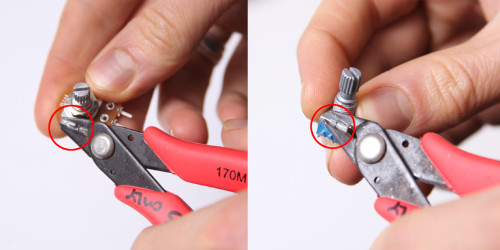
Don’t forget to cut the nubs on the potentiometers as necessary.
Now PLACE (do not solder yet!) the jacks and potentiometers in the circuit board as shown below. Make sure to remove ALL the nuts and washers from your jacks and potentiometers before panel placement. Make sure to put them on the OPPOSITE side of the board from the silkscreen. (see below)
Please read through the whole process before starting!
Now place the panel over the pots and jacks
Fully tighten the nuts on the pots, jacks and switches. Be careful not to over-tighten!
Now you will need to move the panel (please be careful and take it slow) in order to make sure that it is level with the control board. This will involve pulling the pot leads and clamps out of the board just a bit. Take your time and get this right! Your mixer should look like the picture below when aligned properly.
Another option is to place a couple washers (if you have some extras) on the pots before placing the panel to help even out the spacing.
Now carefully turn the board over and solder the pots and jacks in place. Make sure the stereo jack sleeve pin is aligned with the hole for it in the board before soldering!
Next drop a resistor clipping through the hole on the PCB above the stereo jack and make sure it goes through the sleeve contact on the jack. (see below) Then solder it in place and clip the leads.
1/4″ STEREO JACK WIRING
WARNING: If you didn’t purchase your 1/4″ Stereo Jack from us, beware that the pinout may be different from what we show below. Read your datasheet carefully and make sure you wire the proper pins to the T,R, and S solder pads.
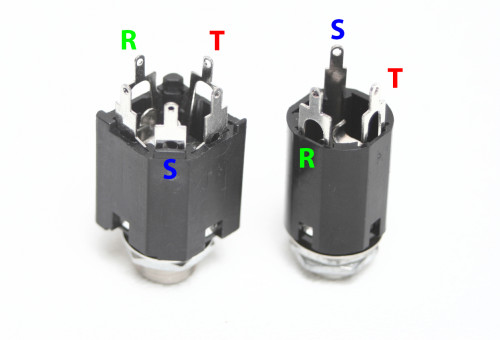
Stereo Jack Wiring
Now cut and strip 3 pieces of wire, and solder to the points on the PCB as shown below:
Now attach the 1/4″ stereo jack to the front panel, aligned as shown below:
Next, clip the wires to an appropriate length and strip the ends. Insert the wires for each connector (T,R,S) through the appropriate connector on the 1/4″ jack and solder, clipping the excess after.
On the PCB, only the T and S are marked. The unmarked wire is for the R connector of the jack.
IC AND 2 PIN JUMPERS
Now insert the IC into its socket, aligning the notch on the IC with both the notch on the socket and the notch in the silkscreen on the PCB. Place the 2 pin jumper over two of the three pins of the headers. If you jumper the Left two pins, you will be in 1x gain mode, and if you jumper the Right two pins, you’ll be in 2x gain mode.
COMPLETED MODULE
You are now done and ready to test your module. If you module is up to par, you are free to add your knobs. Enjoy! If you have any questions or need help debugging, please first refer to our troubleshooting guide BY CLICKING HERE. If this gets you nowhere, please contact us by email for support. Thank you again for purchasing your kit from Synthrotek!



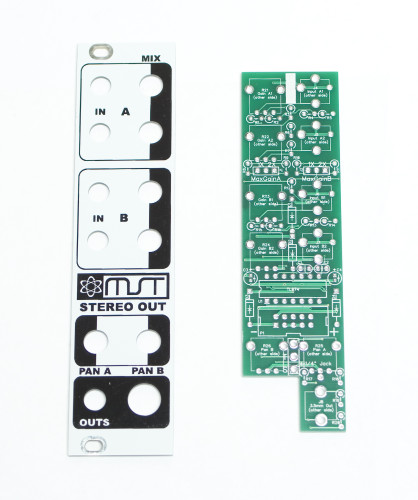
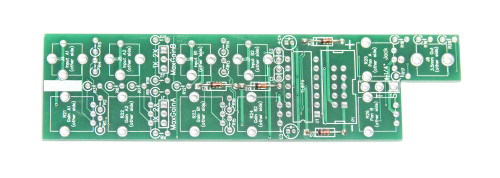
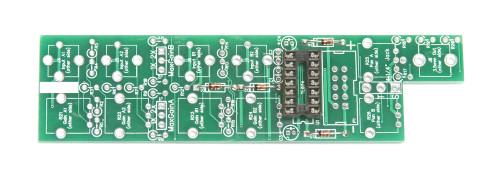
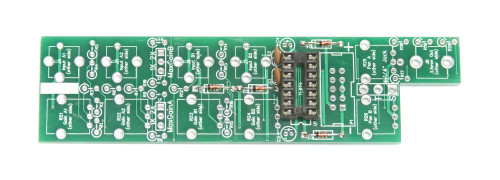
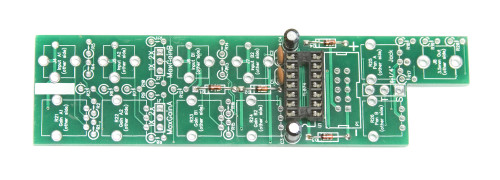
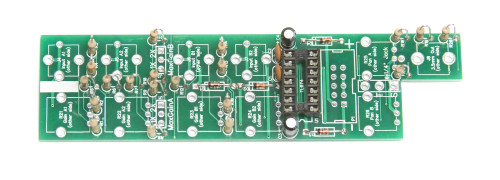
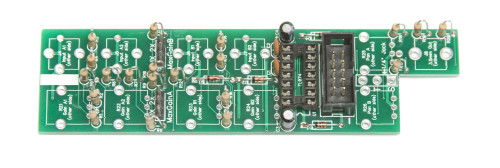
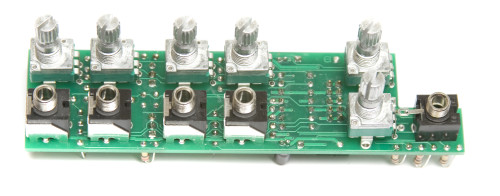
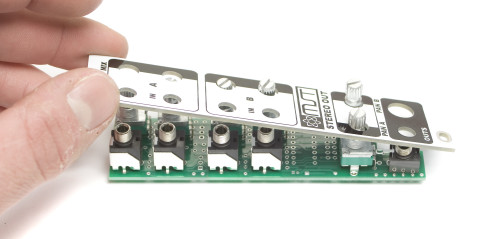
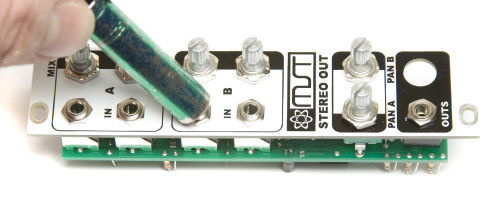
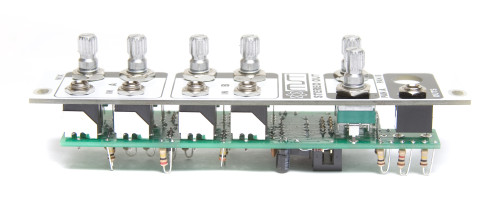

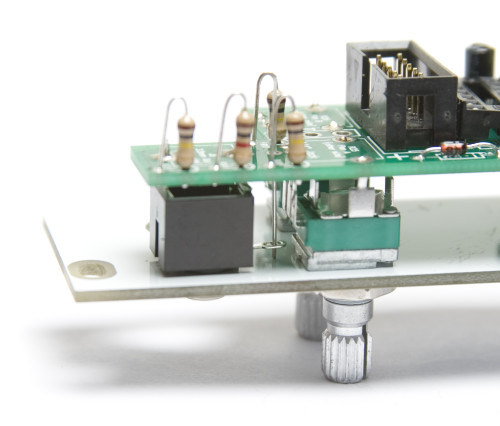

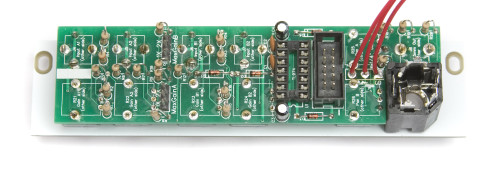

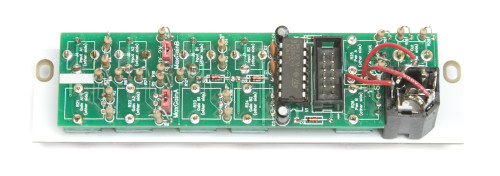
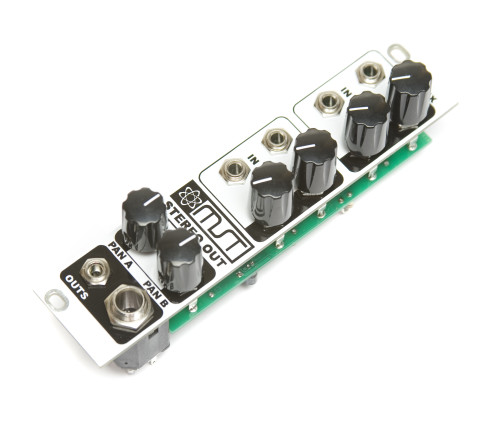
Question: while soldering D1 and D2, I noticed that the anode of D1 and the cathode of D2 is shorted together. Is this correct? Without a schematic I can’t tell.
Thanks
Earl
Yes, that is correct!